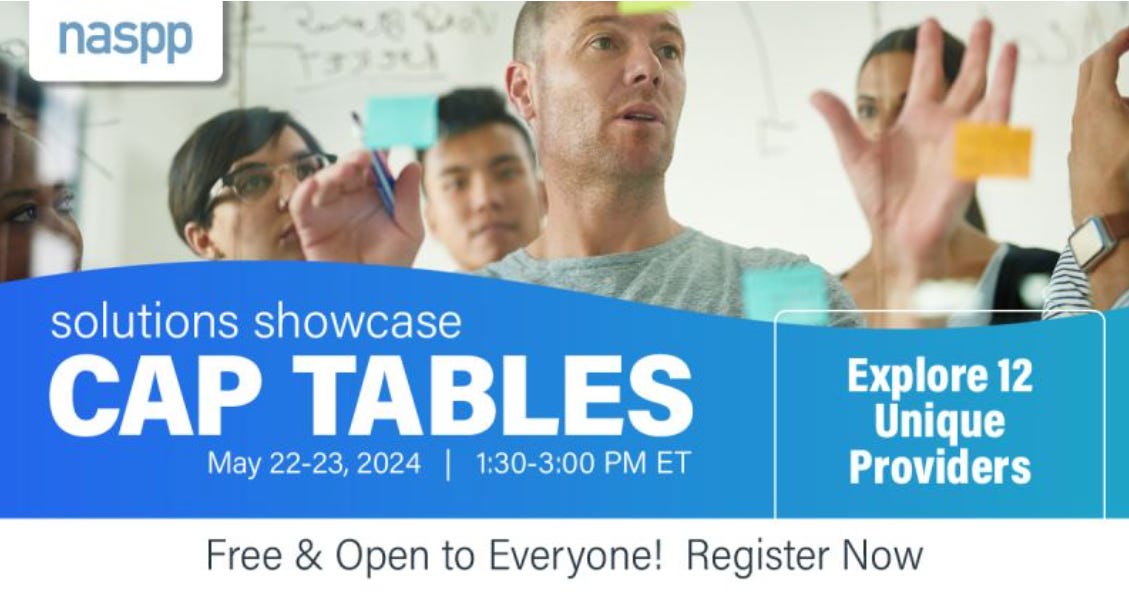No IP assignment? No investment.
You can't touch it, you can't see it... but it's worth bajillions (potentially)
Tl;dr: As a high-growth startup-up, one of your most valuable assets is the intellectual property at the core of your business. If your startup doesn’t own full rights to this IP, it’s uninvestable.
If you’re new here, welcome! Every other week, I dig into my bag of legal insights, built over my 10+ career as a corporate lawyer, and share a story to help you fundraise more smoothly. Subscribe to get these updates straight to your inbox.
We’re in Boston on April 26
Are you founder? Raising a Safe round or thinking about it? In Boston on April 26?
Let’s meet! We’re organizing a side event as part of TechCrunch Early Stage 2024 on Safes.
How’s your cap table looking?
Our friends at NASPP are organizing a two-day event showcasing some of the leading cap table provides on the market today, allowing participants to hear them all and see which one suits them best!
Having a pristine cap table is one of the most important aspects of a company's legal health. Whether it's done through equity management software or a simple spreadsheet, make sure you have this critical element locked in.
To help you with this, we've also open-sourced the spreadsheet-based cap table that we use at Corpora ourselves, available through our website.
Are you crazy? I’m not going to reach out to him!
“We have to get his signature,” said the attorney.
The founder retorted: “Are you crazy? He sent the nastiest note to the whole team when he quit. I’m not going to reach out to him!”
“All the more reason to get his signature.”
“What? And have him blackmail us with IP demands? We’re going to give him ideas!”
“I get that, but if you want to raise this round, we have to get his IP assignment. If you don’t do it now, it’s going to blow up big-time later. You might as well do it now when things are just getting started.”
“I’ll shut down this company and open another one.”
“And this problem will only chase you to your next company…”
It was a matter of pride for the founder. He and his co-founder had had an ugly falling out, and he wasn’t ready to make amends just yet.
But circumstance demanded otherwise.
What’s the matter?
When you’re bringing on investors, they’re going to want to make sure that the company they’re investing in owns or possesses the intellectual property (or IP) that is reasonably necessary for it to run its business.
In other words, they’d like to avoid a situation where someone can “knock” on the company’s door and say, “Hey! You can’t use my IP anymore.” In the story above, that’s exactly what the risk was, and why the attorney was pressing the founder to get his co-founder’s signature to the IP assignment.
You can imagine how this instance – which had remained obscure until time came to fundraise – can become a headache, or worse still, significantly delay closing the round.
Intellectual property: The invisible diamonds
IP isn’t just some asset of the business – it is one of the most valuable assets. Without this, the company is basically worthless. IP is the code. The inventions. The brand and design. The know-hows. A huge part of the company’s value is steeped in assets that cannot be touched, tasted, or seen.
What is IP?
According to the World IP Organization, IP refers to creations of the mind. This can include inventions; literary and artistic works; designs; and symbols, names and images used in commerce. Generally, there are four kinds of IP:
Copyright: IP in literary and artistic works, such as a movie, a book, a painting.
Patent: IP in inventions, such as an EV motor, a page-ranking algorithm, or a new kind of blender.
Trademark: IP in brand assets, such as a company’s name, logo, colors, look-and-feel.
Trade secrets: IP in know-how that holds commercial value for the business, isn’t commonly known, and the business takes steps to keep secret. One of the most popular examples is Coca-Cola’s recipe.
What is IP in a high-growth startup?
For most tech startups, the main IP objects are the following:
Code: Your developers are programming your software that is at the heart of your business. This is IP.
UI/UX: Your designers are designing the interface and experience that your users will see and interact with. These are IP.
Name and logo: You spent a lot of time coming up with the perfect name and logo. Maybe also your hero colors, your brand feel. These are all IP.
Hardware: Maybe you’re a hardware startup, and you’re manufacturing components, machines, systems. Industrial design goes into this as as well. These are all IP.
This list can go on, but the idea is the same: any non-insignificant creation of the brain that helps your business be a business is potentially IP.
Prevent: Sign an IP Assignment on Day 1
As with many (potential) problems, you can either prevent an IP issue from arising in the first place, or cure it if it does, with prevention generally being preferable to curing.
Anyone who does any non-insignificant work for your company must have an IP assignment in place, which should be signed preferably before they start – or soon after.
What’s an IP Assignment?
An IP assignment provides that any and all intellectual property that is created by this person for the company belongs to the company. It may be as simple as a clause and as drawn out as an entire agreement. I bring examples of these documents below.
Who must sign an IP Assignment?
Again, anyone who does any non-insignificant work for your company, including:
Employees: individuals who work exclusively for you, also known as “W2 employees”
Consultants: individuals or companies that provide services to you, but are free to provide services to others as well (also known as contractors).
Advisors: individuals that provide you with – you guessed it – advice, along with introductions to users, investors, etc. Normally, they don’t engage in hands-on work like contractors do, but they are still considered contractors.
What documents should be signed?
Each of the types of service providers above have a typical document type they should sign when starting to work for your company:
Employees normally sign a Proprietary (or Confidential) Information and Inventions Assignment Agreement (aka, a PIIAA or CIIAA).
Consultants normally sign a Consulting Agreement, which includes clauses on IP assignment. Sometimes, they sign a standalone CIIAA instead.
Advisors normally sign an Advisor Agreement, which includes clauses on IP assignment.
Cure: You didn’t sign it on Day 1. Now what?
If you missed signing an IP assignment on Day 1, you can still do it later – but it can get complicated. Here are two scenarios to consider.
The service provider is still working
This scenario is relatively straightforward – you can still sign an IP assignment with your current service provider, while providing that it enters into effect as of Day 1. What this means is that the IP assignment covers all the work that was done for the company from the very beginning. You sign it, they sign it, and you’re all set.
The service provider is about to leave
Say you didn’t sign the IP assignment on Day 1, and your service provider is about to leave the company. This is an excellent opportunity to get an IP assignment signed, as part of a Separation Agreement. This agreement will emphasize that an IP created by the leaving service provider belongs to the company. If the service provider is leaving on good terms, this should again be relatively straightforward. If there’s some grudge, then the company may have to negotiate a mutually beneficial settlement. In any case, it’s not uncommon for a Separation Agreement to be supported by additional compensation (in the form of cash, stock, or both) to make sure the contract is solid.
The service provider has long parted
This is where it gets tricky. As the founder mentioned in the story above, you’ll be giving an ex-service provider ideas if you bring up an IP assignment issue long after they’ve left the company’s employ. You should be strategic about this, weighing the significance of this person’s IP for the company’s business against the presumed likelihood that they’ll make a fuss about it in the future.
In other words, if it’s unlikely that this person will create problems about their IP in the future and, even then, the IP is inconsequential for the business, you might want to let this slide (acknowledging the risk involved).
Alternatively, if this person has created significant IP for the company, then it’s usually preferable to “eat the frog” – to reach out to them, negotiate a settlement, and get the IP assignment signed.
Conclusion: Get it signed asap, check it off your list
When you’re onboarding a new service provider – be it an employee, a consultant, or an advisor – have a checklist handy. One of the main items on that checklist should be getting a signed IP assignment. Do it as soon as it’s confirmed that the service provider will be joining. Get it signed, store it in your records, and move on.
Startup Ecosystem Member Highlight
Over the past years, I’ve had the opportunity to meet with amazing people who are super passionate about startups. I’d love to introduce them to you through this newsletter, as they can be helpful to you as you start, grow, and scale your startup.
Meet Tamir (like “hammer”) Haddad
Tamir is the CEO of Legal and Ops PC, a tech-enabled boutique law firm that is laser-like focused on helping Seed and Series A startups as fractional general counsel. Their approach is to startup legal is the best fit for early-stage startups: fixed pricing for standard needs, guaranteed turnaround times, and referring to specialized providers where appropriate. Coming from a BigLaw background, he and his co-founder, Justin, bring top-notch legal acumen to startups at a fraction of the price. For all of the above, we’re thrilled to have him as an attorney ambassador at Corpora!
Better yet, he’s one of the few lawyers that doesn’t just lawyer, but also applies his acumen to building technology. Doing both is seriously tough, and he’s already managed to deploy several tools through this practice.
Connect with Tamir on LinkedIn, check out his firm, Legal and Ops, and listen in on our conversation in the latest episode of the founder memo podcast:
Enjoyed this newsletter?
Subscribe, share it with a friend, and let me know what you think!
I want to make sure I’m adding value to you and your work with each post, and the best way to know this is hearing back from you. Whether it’s feedback, a question, or a topic idea for a future post, drop me a line or comment below!
Until next time!
Stepan
A bit about me: I’m a corporate lawyer with 10+ years of experience helping 100s of companies navigate the legal journey, including early-stage startups and unicorns. I quit my private practice to start Corpora and help founders raise money faster and more affordably. Let’s connect on LinkedIn.









